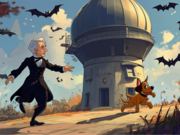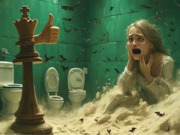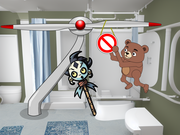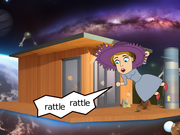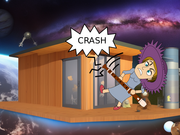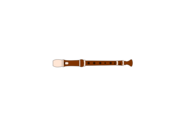(pronoun) this; these / (bound form) this; the (followed by a noun) / (bound form) this; these (followed by a classifier) (in this sense, commonly pr. [zhei4], esp. in Beijing)
youngest / most junior / tiny / one (unambiguous spoken form when spelling out numbers, esp. on telephone or in military) / one or ace on dice or dominoes / variant of 吆[yao1], to shout
many; much / too many; in excess / (after a numeral) ... odd / how (to what extent) (Taiwan pr. [duo2]) / (bound form) multi-; poly-
多
=
夕
:
Mnemonic symbol: Immanuel "Many" Kant.
Many (多) and Doggy Dog (du) have great fun chasing a bat (夕) in front of the observatory (o1). After a while there are two bats (多), and it's not so easy to chase them any more. Suddenly there are more and more (多) bats! Now Many and Doggy Dog experience what it is like to be chased for a change.
Many (多) and Doggy Dog (du) have great fun chasing a bat (夕) in front of the observatory (o1). After a while there are two bats (多), and it's not so easy to chase them any more. Suddenly there are more and more (多) bats! Now Many and Doggy Dog experience what it is like to be chased for a change.
will / shall / to use / to take / to checkmate / just a short while ago / (introduces object of main verb, used in the same way as 把[ba3])
general / commander-in-chief (military) / king (chess piece) / to command / to lead
(bound form) a general / (literary) to command; to lead / (Chinese chess) general (on the black side, equivalent to a king in Western chess)
unexpectedly / to one's surprise / in spite of everything / in that crazy way / actually / to go as far as to
unexpectedly / actually / to go so far as to / indeed
竟
=
儿
+
音
:
Mnemonic symbol: Jack in the Box.
Sun Wukong tells Joan of Arc to turn the handle of his Jack in the Box in the engine's bathroom. She does so and after turning for a bit a clown with a loudspeaker in each hand jumps out and surprises Joan of Arc. Unexpectedly, the loudspeakers play deafening loud unholy metal.
Sun Wukong tells Joan of Arc to turn the handle of his Jack in the Box in the engine's bathroom. She does so and after turning for a bit a clown with a loudspeaker in each hand jumps out and surprises Joan of Arc. Unexpectedly, the loudspeakers play deafening loud unholy metal.
to beat / to strike / to hit / to break / to type / to mix up / to build / to fight / to fetch / to make / to tie up / to issue / to shoot / to calculate / to play (a game) / since / from
only / merely / no more than / but / however / anyway (to get back to a previous topic) / cannot be more (after adjectival)
to cross / to go over / to pass (time) / to celebrate (a holiday) / to live / to get along / excessively / too-
one / single / a (article) / as soon as / entire; whole; all; throughout / "one" radical in Chinese characters (Kangxi radical 1) / also pr. [yao1] for greater clarity when spelling out numbers digit by digit
(classifier used before a noun that has no specific classifier) / (bound form) individual
monkey / CL:隻|只[zhi1]
猴
=
侯
+
犭
:
Hamlet (h) and a monkey (猴) are watching a huge portrait of the marquis (侯) holding a dachshund (犭) on his lap in the outhouse's kitchen (ou2). Hamlet recognizes the murderer of his father in him an shakes his fist at him, while the monkey mocks him by making funny faces and sticking out his tongue.
